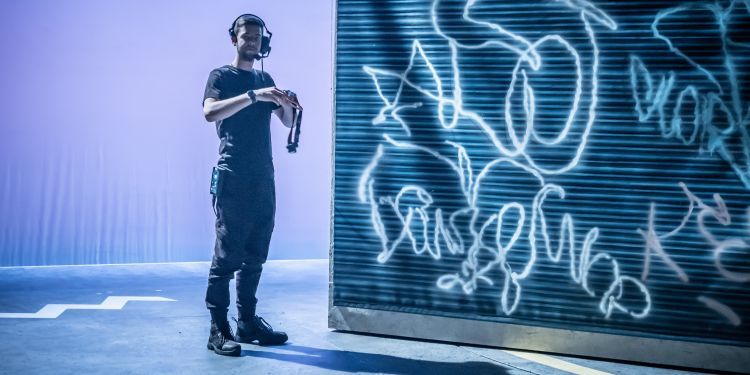

Interview
Jon Hare is Guildhall’s Outreach Manager (Production Arts), responsible for projects that widen the reach of our Production Arts department. Sian Brittain is the Head of Innovation at Guildhall School. The Innovation department aims to facilitate knowledge exchange and new thinking with partners beyond the conservatoire, looking at ways in which we can adapt and apply our expertise for collaboration with the wider world. We spoke with Jon and Sian about the Untold project, which takes production arts workshops into a prison in south-east London, supporting prisoners to develop valuable skills and pursue careers in production arts upon release.
What is the Untold Project?
Sian: The project started when I was introduced to the Governor of HMP Isis, a prison in Thamesmead, where prisoners are usually up to 24 years of age and serving sentences of up to 12 months. The Governor feels that the time prisoners spend there is an opportunity to support their learning, so they can make a change in their lives when they are released. They have brought in lots of different arts projects in the past which have been transformative in the moment, but do not leave participants with long-term transferable skills. Once the project ends, the level of happiness immediately drops.
Our aim was to create a project offering real training in production arts to prisoners, so they have fun in the workshops, but also gain practical skills that could help them enter the industry in an entry-level role. We ran a pilot in summer 2021, which offered a taster in a range of production arts courses. It was very successful. We have since been continuing the conversation to see how we can support the prison to deliver a more sustained training programme that gives participants the opportunity to develop a more extensive skills base and improve their employability.
What did the project achieve?
Jon: Our key aims were to help rebuild these young men’s lives, be a catalyst for greater diversity in the creative industry and to bring together two key elements of successful rehabilitation: personal growth and tangible employment opportunities.
We ran six separate workshops on different production arts skills: Lighting, Sound Design, Video Design, Stage Management, Scenic Construction and Scenic Art. At the start of the workshops, it was difficult to engage the participants. We knew from our security training that prisoners often do not express emotion because it can be seen as a sign of weakness, and this was certainly the case when we first met our participants. One success for us was a course tutor reporting that one of her participants smiled at her for the first time, on the last day of the course.
Many participants asked us what they could earn if they went into these careers and how they could find a job upon release. We are developing a response to this in our next set of courses. A priority is offering them enough support to find entry-level crew jobs upon release in companies such as Gallowglass, an industry leader in the events sector.
How could the Untold project support prisoners upon release?
Jon: We are partnered with industry organisations including Gallowglass: when they recruit people via Untold, they will know that their new team members might need some additional support when they start and they can provide that. Recently, two released prisoners found employment at Gallowglass through this scheme.
Our long-term hope for this project is to reduce reoffending amongst our participants. Upon release, the skills participants have learned with us can give them something to aim for. A big problem for many young offenders is that they are released from prison, return to their previous environment, and then reoffend. It is difficult to escape their social groups, as they often face pressure upon release to re-join groups they were previously involved with. Untold gives them a new opportunity and network of people they can spend time with, giving them the chance of a different path in life.
Our wellbeing initiatives provide vital support to local communities, from enabling people to develop the skills they need to change their lives, exploring neglected health concerns using innovative research methods and much more. With your help, we can continue to enhance the wellbeing of our local community and have a positive impact that reaches far beyond Guildhall.
You can make a donation using the link below. Gifts of any size will make a real difference. Thank you.
Donate now
Give via our donation formAlternative Donation Methods
You can also donate by sending us a cheque made out to the ‘Guildhall School Trust’ to the below address, marked as 'Welfare Appeal':
DARO
Guildhall School of Music & Drama
Silk Street
Barbican
London
EC2Y 8DT
If you would like to discuss the appeal in more detail or would like to donate via an alternative method, please get in touch with our Development team.
